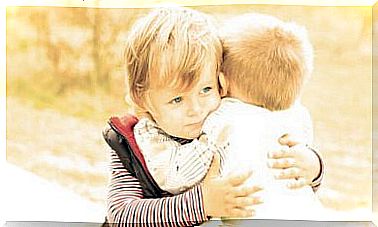Family Love: Understanding, Acceptance And Protection

Family love is the nutrient that sustains everything. Growing up, being educated and being part of this first favorable scenario, rich in affection, values and security, undoubtedly constitutes an exceptional boost for the psychological health of every person. A part of who we are now is, in many cases, those early experiences and bonds created with our parents.
Salvador Minuchin, an Argentine psychiatrist and creator of structural family therapy, said that, in any culture, it is the family that transmits its own identity to its members. It does this in two opposite ways: it gives us a sense of belonging and, on the other hand, the desire to separate us from it. Although it seems contradictory, this has a valuable explanation and teaching.
We are all part of a family legacy, of a small social nucleus where our roots are. Regardless of whether we love the family a lot or a little, every child’s goal is to get away from the parents at some point. Creating your own life and building your own reality with other people is what is expected, what is necessary and what, in the final analysis, defines our human development.
Affection is, in all cases, the backbone of good relationships. However, it is not enough to just love; it is necessary to love well for this family to be healthy and functional.

Family love and the components that make it up
Every 15th of May is celebrated family day. As the United Nations explains, we still have several fronts to cover in the coming years; above all, seeing the gap in the social and economic crisis that could open up soon. Therefore, we need to improve the protection policy for families, address the reconciliation aspect and respond to all the needs in an increasingly complex and changing world.
The role that families play in our society in the care, education and care of children is undeniable. After all, they are the basis of human development and also the pillar that favors social transformation. Therefore, it is not just a primary core to be served in terms of health and financial resources. One pillar that we cannot neglect is, without a doubt, the psychological.
Different types of family and the same rights
The family’s love must always be there, no matter how it is formed. There are single mothers and fathers who also choose to live the adventure of motherhood in solitude. There are extended families living under the same roof: children, parents and grandparents facing difficulties together, enjoying together the education of the little ones.
In our society, there are also homoparental families, demonstrating that diversity is also part of our daily reality and that, as such, it deserves our respect and normality. The formation of these social nuclei favors the transmission of values, affections, the good physical, emotional and psychological development of younger people, as well as attention to the components that make up every healthy and functional family system. They are as follows:
- Good communication.
- Establish clear boundaries to promote early learning of rules and rights.
- Creating an environment where people can express emotions and learn to manage them.
- Adequate expression of affection, especially avoiding the projection of trauma from parents to children.
- Education for conflict resolution, assertiveness, good social relationships…

Love in the family, the love that nourishes and doesn’t limit
The family’s love must be healthy and act, in turn, as a support in which each member finds the security to continue growing, to make their own decisions knowing that they are respected.
So, as we well know, there are loves that limit, that prevent any child from having a good psychological and emotional development. We speak, for example, of overprotection, of excessive affection that does not let it be, that dominates and limits.
It is important that every family nucleus understands that in addition to the economic aspect, with better or worse resources, there is undoubtedly an emotional aspect. It does not matter which school the child attends, how many toys or clothes they have, if the following aspects are not met:
- Understanding: Nothing is as relevant as understanding the point of view of any family member. Being able to put yourself in someone else’s shoes is essential to building healthy and strong emotional bonds.
- Acceptance: This second dimension is another basic nutrient. Knowing that we are loved, no matter what decision we make, is something we always need.
- Protection and care: there is something we all know: to love is to care. Few things are as comforting as feeling protected and cared for by the people we love and, in turn, being able to offer the same to those who care for us.
To conclude, nothing is as important as family love, this love that protects and, at the same time, knows how to let go. Understanding where our roots are, but being free to create the life we want, is a psychic tendon of happiness.









